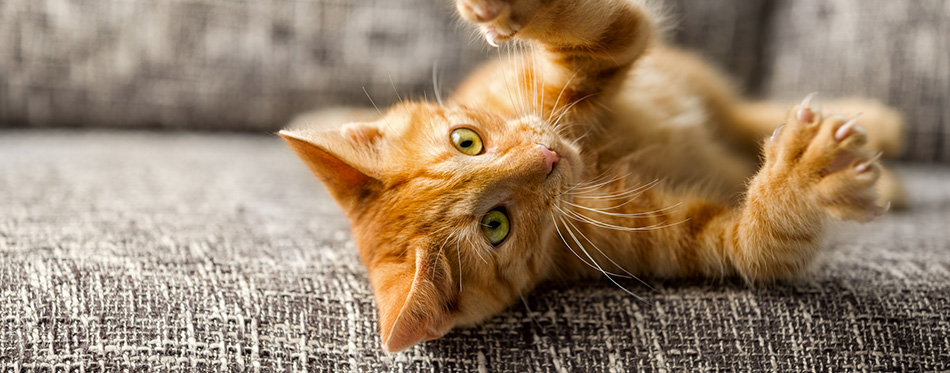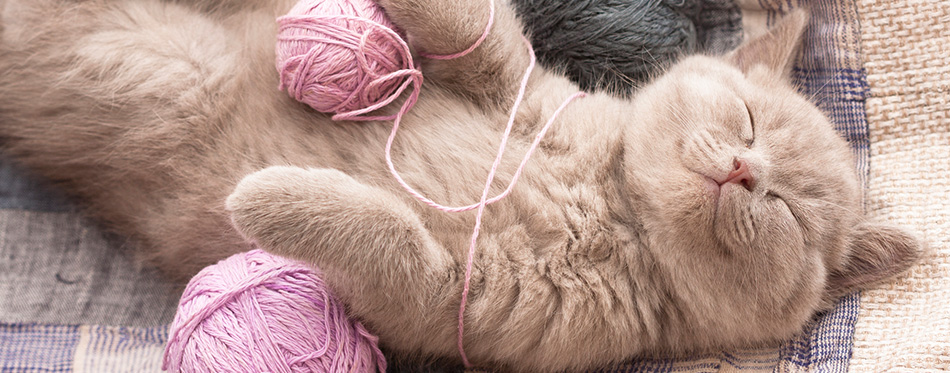Autism is becoming more and more of a familiar term in households as more children in recent times than ever before are being born autistic. In fact, according to a study by the Center for Disease Control (CDC), 1 in 59 children within the United States alone are estimated to be autistic.
Interestingly, autistic spectrum disorder is largely known among the human race and much less so amidst felines. Observable in children as young as 2 years of age especially as they struggle with basic social skills with marked problems making friends and struggles with communication, it is not particularly hard to notice when something seems ‘off’ with an autistic child. It would appear autism is not limited to humans but with some cat owners observing seemingly autistic behaviors in their pets.
In humans, the avoidance of eye contact, difficulty expressing emotions or recognizing same in others, repetitive behaviors and a blank stare are dead giveaways of autism for which a visit to the doctor for tests can confirm. In felines, which aren’t typically very social animals in the first place, determining if your cat has autism spectrum disorder can be a lot trickier. A review of the common signs of autism would help narrow down the possibility.

Common Signs of Autism
The presence of autism spectrum disorder is often characterized by a struggle to express emotions by the sufferer, an unwillingness/disinterest in physical contact, sound and light sensitivity, a preference for solitude and an unchanged routine, avoidance of eye contact and a tendency towards repetition. Do these symptoms read like behaviors your kitty exhibits? If yes, you are not alone in thinking your cat just might be autistic. Many cat owners share similar sentiments.
Understanding Feline Behavior
As many regular cat mannerisms are very similar to the signs of autism, it is not such a stretch for kitty owners to assume their beloved pet is struggling with the disorder. For instance, some cat owners who have observed that their pet is withdrawn and recoiling from being cuddled with them dodging sharp claws from a cranky cat may well assume something is amiss. Not so fast though.
Keep in mind that a cat by its very nature is a loner. So its preference for solitude may very well be it simply being its true self than anything else. When you should be rightfully worried is if this is a new development in your cat. If you’re previously ‘keen on snuggles’ kitty suddenly cannot seem to bear you touching it and this new behavior is fast becoming the new norm, it is worth getting kitty checked out. Although autism might be your first suspect, it is best to leave any diagnosis to the pros to rule out any possible infections or mental disorders.
Cat Personalities
Are you getting a weird feeling your cat is avoiding you that you just can’t shake? Does the sight of visitors send kitty scurrying for cover or have it acting flat out hostile? Your observation of kitty being rather unfriendly and anti-social may very well be correct. The reasons behind such behavior though are another matter entirely. What you consider anti-social behavior from a human perspective is simply normal kitty behavior. Cats by their very nature love routine and the sudden appearance of new/strange faces could be upsetting to it.
Before you decide something is off with your cat and you decide it is autistic, it is always good to consider if the strange behavior is newly acquired or it has been that way from the start. If your kitten is new and you are only just getting familiar with it, don’t be too quick to assume something is wrong. What you consider strange might just be your cat’s normal behavior. As with even humans, cats too have personalities. Here are some tips to help ascertain their character;
How they react to new visitors: The level of exposure your cat has had to persons other than you is also a factor in this behavior. Perhaps, you are a millennial who has since resigned to living out your days in singledom (sic) with your cat for company, only to suddenly find love with your significant other moving in and their friends dropping by every other day to assist with them settling in? Kitty might not have gotten the memo that the days of a quiet house all to yourselves have come to a screeching halt and react badly to the sudden and seemingly endless stream of new faces filling up the house.
If your feline though has enjoyed a great deal of exposure to lots of faces perhaps with your family and neighbors only to suddenly do an about face and start becoming anti-social, it is worth getting the situation looked into by a veterinarian. This becomes even more imperative when such social struggles last for several days.
Extroverts vs Introverts: Some of our species are very extroverted being in their element as the life of the party while the introverted thrive in solitude, enjoying only the company of close friends. Your cat could simply be introverted and prefer spending one on one time with you than having to deal with all your friends. With cats, some breeds are more extroverted and social than others. The Persian, Burmese, Abyssinian, exotic shorthair, Ragdoll and Maine Coon are very sociable kitty breeds worth considering if you prefer having a friendly cat.
Siamese, Sphynx, Bombay, Singapura, and Bengal cats are special breeds that are very popular with feline lovers yet have special social needs that if not met can display an aggressive side that belies that attractive looks. Siamese cats, for instance, are big on human contact and readily form a loving bond with their owner. Getting excited already? Slow down a little. Siamese cats have a territorial side to their nature that makes them prefer a one on one exclusive type of bond with no room for including others.
Singapura cats are also very skittish around new faces preferring the company of their owners. If the visitor decides to get friendly with a Singapura kitty, such a person could get clawed by a feline who interprets such friendship overtures as a threat and invasion of its personal space. Bombay cats, on the other hand, are not big on surprises or loud noises. They react very badly and aggressively when exposed to either. If you are a family person with small children in the house and their propensity for mischiefs such as sneaking up on kitty or loud screaming, you might want to consider not getting a Bombay cat.
They simply do not mix well with kids. Having your cute little baby slashed by a threatened cat is a scenario best avoided. Manx cats share similar characteristics with Bombay except they are much more friendly and playful especially with their owners but not so much with their owner’s small children. Seeing as its breed has a lot of bearing on a cat’s behavior, this should be taken into consideration when deciding whether or not kitty could be autistic.
With this understanding of feline behavior and how many of a cat’s normal behavior fit the autistic bill, the question of whether it is even possible for a cat to be autistic arises.

Best Ways to Treat Signs of Autism
Seeing as the very behaviors in cats that when observed in human beings can be alarming and worrisome are in cats normal behavior, one can safely assume that although cats share some illness with the human species such as depression and organ failure to name a few, autism spectrum disorder is not one of them. However, if you do catch a few signs of autism, maybe it’s best to consider the following tips;
Avoid prolonged eye contact: If having eye contact with evenings spent gazing lovingly into your pet’s eyes as you cuddle is one of your love languages, resist the urge to get into a staring match with your feline.
Do both yourself and your kitty a huge favor and save the ‘loving’ gazing for your fellow humans or maybe even a dog. Those two species are much more likely to feel all that love you are communicating through the eyes. With felines, you will more likely than not elicit a hostile response. Prolonged eye contact in the feline world is perceived as threatening. Kitty could imagine in its feline mind that you are sizing it up to do it harm or in the case of a confident cat that you fear it.
Whichever scenario your cat has figured in its mind, neither would end well for you if you don’t cut out all that ogling. Stare long enough and an enraged cat could make a move on your eyes especially if you are within its reach. The same rule goes for cuddling. Depending on how friendly the breed you have got on your hands, some kitties aren’t big on snuggly time. Some might put up with it on occasion because they are crazy in love with you while other less sociable breeds cannot even suffer through it.
Avoid too many cuddles: The feline distaste for snuggles is very reminiscent of many humans. This is especially true on those cool, rainy nights where your partner is laid upon the bed wearing your favorite nighty and you crawl in under the duvet, eager to have them in your arms; quality cuddle time on your mind and maybe even something more only to get your overtures repeatedly rebuffed.
People around the world can testify to how frustrating that experience can be and are even more testimonies abound on what the reaction is from others when you refuse to take the hint and keep making moves. The downcast, sleep-deprived eyes, and disoriented manner observable in many people the day after who failed to learn fast hold untold tales of how their heads almost got chewed off.
Thankfully, the weapons of the many of us are limited to a scathing look and harsh words shot in our direction. With kitties that come fitted with sharp claws though, they will ensure you learn to cut out the holding the hard way.
You may also like our articles on Cat Nail Clippers and Nail Caps for Cats.
Avoid comparing cats to humans: If your cat doesn’t seem as enthralled with the fancy new toy you got for it that set back your finances quite a bit as you do, do not go comparing it to that time your autistic niece showed no appreciation or enthusiasm about your gift. Kitty is highly unlikely to be autistic. It is quite a feat to get a feline excited. Simply revel in your cat’s joy in playing around with the cardboard box the toy came in or the bag of string that fell out of the Missus’ crotchet basket. Cats have much more simple tastes and are happy with the little things.
The same goes for trying to force kitty to bond with your always drunk Uncle Steve whenever he decides to drop by. Do not go labeling your cat autistic because it isn’t keen on certain individuals. Preferring solitude over spending time with your guests is not always about being anti-social.
Even cats have their moods or dislike for certain people for reasons best known to it. Even you can remember how your partner practically has to drag you out to the living room once crazy Aunt Jane and Uncle Jack hit town despite your many decades together. You just can’t seem to get along with those two and would rather enjoy your own company.

Insufferable as you are, your cat just might rather prefer you to all the racket that Aunt Jane and Uncle Jack represent especially Auntie’s affinity for forced cuddling with it.
Whatever bond you hope to develop with your cat either a friendly one or a more independent style relationship, it is best to get the ball rolling while your cat is still young. The popular phrase ‘catch em young’ has never rung truer. A kitty raised in an environment chock full of little kids and their loud noises with many adults is much more likely to grow into a well-adjusted and friendly cat comfortable with people whether new or strange its breed notwithstanding.
Sources:
- I Think My Cat Has Autism – The Dodo
- What Is Autism Spectrum Disorder? – WebMD

